Tag Archives: Whale Entanglements
First Circuit likely to save the whales despite lobstermen’s complaints
 An epic sea battle unfolded at the First Circuit Tuesday as Massachusetts fishermen tried to harpoon federal regulations that protect the North Atlantic right whale. But it appeared the judges were on the whales’ side and, as in “Moby Dick,” the fishermen may end up shipwrecked. At issue is a federal rule that limits lobster and Jonah crab fisheries’ use of buoy lines, which can entangle and kill whales. The fishermen’s lawyer, Daniel Cragg, told the judges that the rule resulted from Congress making a “drafting failure,” but the judges seemed incredulous. more, >>CLICK TO READ<< 10:52
An epic sea battle unfolded at the First Circuit Tuesday as Massachusetts fishermen tried to harpoon federal regulations that protect the North Atlantic right whale. But it appeared the judges were on the whales’ side and, as in “Moby Dick,” the fishermen may end up shipwrecked. At issue is a federal rule that limits lobster and Jonah crab fisheries’ use of buoy lines, which can entangle and kill whales. The fishermen’s lawyer, Daniel Cragg, told the judges that the rule resulted from Congress making a “drafting failure,” but the judges seemed incredulous. more, >>CLICK TO READ<< 10:52
Crab fishermen test pop-up fishing gear to reduce whale entanglements
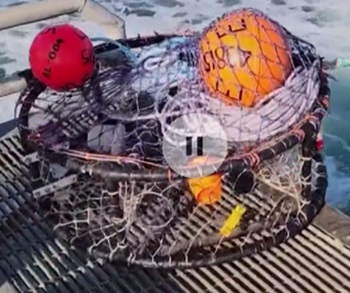 Traditionally, the Dungeness crab fishing season runs from November through June using vertical line fishing gear that spans from the surface to the seafloor. After whale entanglements spiked from 2015 to 2018, the Dungeness crab season has faced delay or closure since 2019. Season closures are affecting the fishing business, but now during this closure, a handful of commercial fishermen such as Brand Little, are testing a whale-safe kind of fishing gear, called “pop-up” or “ropeless” fishing gear, hoping the state will authorize this alternative for use next season, so fishermen can still work. Commercial fisherman Brand Little described how the first test of the spring season went with about 20 fishermen. Video, more, >>CLICK TO READ<< 08:59
Traditionally, the Dungeness crab fishing season runs from November through June using vertical line fishing gear that spans from the surface to the seafloor. After whale entanglements spiked from 2015 to 2018, the Dungeness crab season has faced delay or closure since 2019. Season closures are affecting the fishing business, but now during this closure, a handful of commercial fishermen such as Brand Little, are testing a whale-safe kind of fishing gear, called “pop-up” or “ropeless” fishing gear, hoping the state will authorize this alternative for use next season, so fishermen can still work. Commercial fisherman Brand Little described how the first test of the spring season went with about 20 fishermen. Video, more, >>CLICK TO READ<< 08:59
Crab gear reduction for commercial fishers extended through mid-March
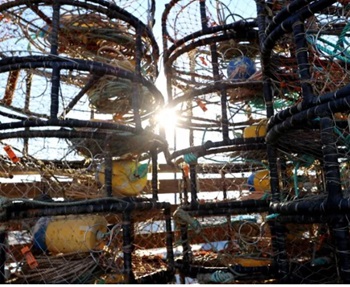 Less than a month after the commercial Dungeness crab season opened in the Monterey Bay region, the California Department of Fish and Wildlife (CDFW) has extended the gear reduction in all fishing zones south of the Mendocino/Sonoma County line. “It’s about the minimum we can survive on viably,” fisher Tim Obert told Lookout in January. Obert is a Santa Cruz native who has fished commercially for more than two decades. He serves as president of the Santa Cruz Commercial Fishermen’s Association and sits on the state’s Dungeness Crab Task Force. more, >>click to read<< 10:42
Less than a month after the commercial Dungeness crab season opened in the Monterey Bay region, the California Department of Fish and Wildlife (CDFW) has extended the gear reduction in all fishing zones south of the Mendocino/Sonoma County line. “It’s about the minimum we can survive on viably,” fisher Tim Obert told Lookout in January. Obert is a Santa Cruz native who has fished commercially for more than two decades. He serves as president of the Santa Cruz Commercial Fishermen’s Association and sits on the state’s Dungeness Crab Task Force. more, >>click to read<< 10:42
Where will the whales be? Ask the climate model
In a new study, scientists say they can now use global temperature models, commonly used in climate science, to predict up to a year in advance when hot ocean temperatures will raise the risk of whale entanglements. This lead time could allow state regulators, fishers and other businesses that depend on the fishery, as well as Californians hoping for a Dungeness crab holiday meal, to plan ahead for potential fishing restrictions. Ecological forecasts could help New England and maritime Canada, where highly endangered right whales are also getting entangled in fishing gear. “My personal opinion is that this is very, very helpful,” said Richard Ogg, a commercial fishing boat captain based in Bodega Bay. more, >>click to read<< 11:57
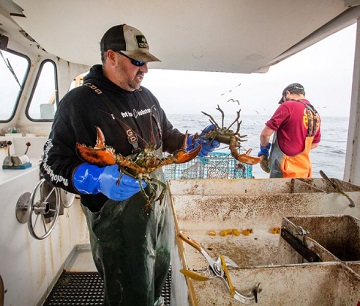
Canadian and American lobster industry confronts ‘ropeless’ traps after whale entanglements
Injuries to endangered North Atlantic Right Whales ensnared in fishing gear have fueled a prominent campaign by environmental groups to pressure the industry to adopt on-demand equipment that only suspends ropes in the water briefly before traps are pulled from the water. To address the problem, the U.S. and Canadian governments have imposed new regulation on lobster and crab fisheries in recent years, including the use of weak links in rope that break if a whale swims through, color-coded rope for tracing, adding more traps per buoy line, and zone closures during whale migration. Washington and Ottawa are now promoting ropeless fishing as a possible long-term solution. But lobstermen, particularly in Maine where 80% of U.S. lobster is caught, are not enthusiastic. >click to read< 08:49
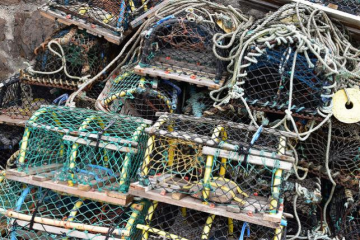
Simple solution found to reduce number of whales getting caught in fishing gear
A working group has come up with a simple solution to use heavier sinking rope connecting fishing creels, which will in turn reduce entanglements. At the moment, creel fishermen often use rope that floats, in which whales, dolphins and other marine animals can become entangled in. Creels, also known as pots, are connected by ropes, which are set around Scotland’s coasts to catch prawns, crabs and lobsters. During the project, commercial creel fishermen from all around the Scottish coast were interviewed and their contribution allowed the researchers to better understand the nature and extent of entanglements in Scotland’s waters. The findings have been published in the journal Endangered Species Research. >click to read< 12:11

Letter: Right whale entanglements – the undocumented and unknown statistics
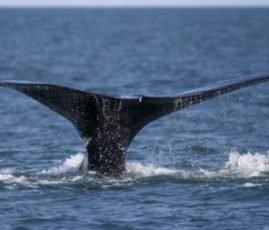
Whale entanglements dropping but threat remains, feds say
The number of whales entangled in fishing gear has declined recently, but the entanglements remain a critical threat to rare species, the federal government said in a report released Tuesday. There were 53 confirmed cases of large whales entangled in gear in the U.S. in 2020, the National Oceanic and Atmospheric Administration said Tuesday. That was a 25% decline from the previous year and a lower figure than the 13-year average, the agency said. Every coastal region except Alaska saw a decrease in whale entanglements, NOAA said. >click to read< 16:06
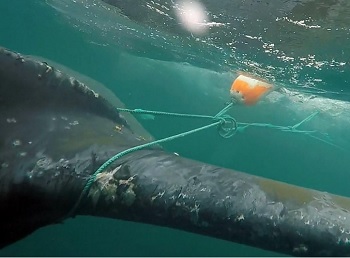
Whale entanglements, crab gear, and what can be done
Whale populations are recovering, and whales are on the move early this year. That’s led to five humpback whale entanglements in crab gear, prompting the California Department of Fish and Wildlife to close the commercial Dungeness crab season two months early. With a population that is “definitely recovering” and five entanglements over a month and a half, Bartling conceded, “We’re in uncharted territory.” Three of the entanglements were confirmed with commercial California Dungeness crab gear, while the other two were “not identifiable, but the gear is consistent with what could be commercial Dungeness crab gear.” >click to read< 10:15
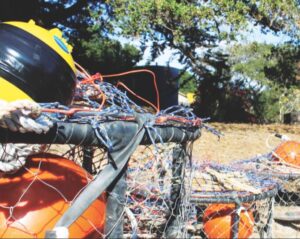
Dungeness Crab Season Could be Delayed Again this Year – The push for pop-up gear systems
This year, according to NMFS data, there have been 16 confirmed whale entanglements along the West Coast through Sept. 30. That includes 10 humpback whales, four gray whales, one fin whale and a minke whale; 11 other reports could not be verified. The vast majority of these reports came from waters along California. The California Dungeness Crab Fishing Gear Working Group, known informally as the Whale Working Group, was created in September 2015 and is made up of industry players, government officials and environmentalists looking for solutions. >click to read< 09:53
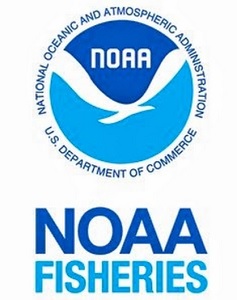
Pot/Trap Fisheries Regulations to Help Save North Atlantic Right Whales Announced
NOAA Fisheries and our partners are dedicated to conserving and rebuilding the North Atlantic right whale population, which is endangered, declining, and experiencing an ongoing Unusual Mortality Event. Entanglement in commercial fishing gear is a primary cause of mortalities and serious injuries of North Atlantic right whales. Working with the Atlantic Large Whale Take Reduction Team, a group of advisors consisting of fishermen, scientists, conservationists, and state and federal officials, we have completed Phase 1 of the modifications to the Atlantic Large Whale Take Reduction Plan to continue to reduce whale entanglements. Today, we are announcing the final rule to modify the Atlantic Large Whale Take Reduction Plan. >click to read< 15:22
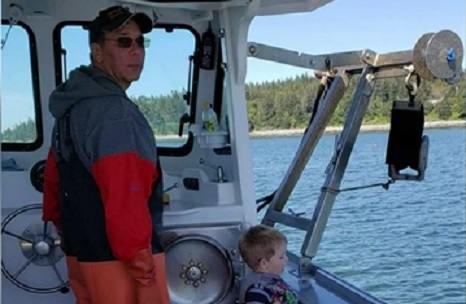
“What I’m reading now being proposed by NOAA will essentially put me out of business,,,”
Lobsterman John Drouin said in his 42 years of fishing around Cutler, he has never seen a right whale. Many other Maine lobstermen have said the same thing about their experience on the water. But that may not matter.,, he and Maine Marine Resources Commissioner Pat Keliher said the true threat in the NOAA documents would come in 10 years when scientists say the threat to whales should be reduced by 98 percent, effectively eliminating all lobster ropes and potentially ending the way they have fished for generations. “It’s devastating. Totally changes the face of the Maine lobster fishery,” said Keliher, “and we’d have no idea from an economic standpoint what it will mean in the long run.” >video, >click to read< 09:38
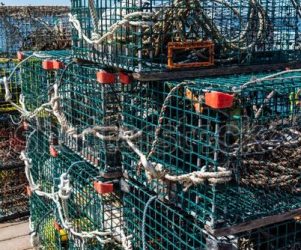
Lobstermen react to proposed NOAA rule
A Jan. 20 public meeting on the latest proposal to reduce the risk of whale entanglements in fishing lines focused on northern and eastern Maine lobster fishing. At this latest meeting, local lobstermen echoed similar concerns they aired when discussions started two years ago: NOAA is relying on incomplete and outdated data, and fishermen are not seeing right whales in Maine waters. NOAA scientists agree that more data would be useful. >click to read< 08:19
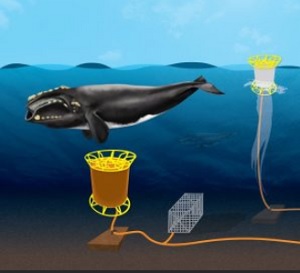
Everything you’ve heard about ‘ropeless’ fishing gear is false.
Is so-called “ropeless” fishing gear the magic bullet for the perceived problem of marine mammal interactions in California’s crab fisheries? (what about the New England lobster fishery?) Several profit-driven environmental groups, including Oceana, would like the public and the California Department of Fish and Wildlife (CDFW) to believe it is.,,, In truth, there have only been four mortalities attributed to CA commercial Dungeness crab gear since 2013, and none during the last two seasons.,,, Maine’s lobster fishery has never had a documented serious injury or mortality for any Right whale, and no entanglement since 2002, which makes this a non-problem. One of the problems with “ropeless” gear is that it’s a misleading term used by the profit-driven environmental groups to make it seem harmless. >click to read< 15:06
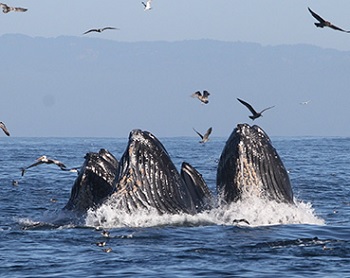
Study connects marine heat wave with spike in whale entanglements
A new study shows how the record-breaking marine heat wave of 2014 to 2016 caused changes along the U.S. West Coast that led to an unprecedented spike in the numbers of whales that became entangled in fishing gear. “With the ocean warming, we saw a shift in the ecosystem and in the feeding behavior of humpback whales that led to a greater overlap between whales and crab fishing gear,” said Jarrod Santora, a researcher in applied mathematics at UCSC’s Baskin School of Engineering and first author of the study,,,,>click to read< 10:02
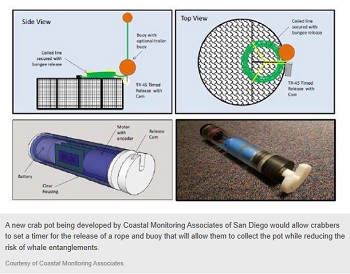
Ropeless Fishing Gear: New Crab Pot Could Help Reduce Whale Entanglements
Last year 46 whale entanglements were reported off the West Coast, and crab gear was responsible for about a third of them. According to Derek Orner, a bycatch reduction program coordinator with the National Marine Fisheries Service, this a growing problem,,, His agency recently announced grants for several ropeless fishing gear projects, including a new kind of crab pot developed by Coastal Monitoring Associates of California. >click to read< 09:43
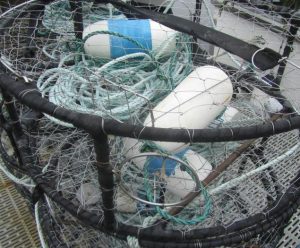
Opinion: Reducing whale entanglements
Oregon’s commercial crabbing industry prides itself on sustainability. Though Dungeness crab has been harvested commercially since the late 1800s, this population is considered to be stable to increasing along the West Coast—thanks to commercial and recreational regulations that protect the breeding population and ensure the state’s official crustacean will be conserved for future generations. Now, the fishing industry is facing a new environmental challenge—whale entanglements in crabbing gear. by Dr. Caren Braby, >click to read< 11:40
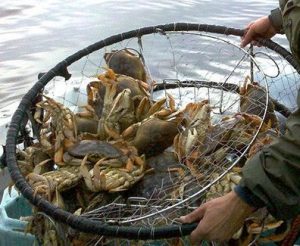
Fewer Whales Caught in Crabbing Gear After Settlement, but,,, there’s always that but,,,
The National Marine Fisheries Service reported 18 whale entanglements through Aug. 23, 2019, compared to 40 ensnared whales found during the same period last year. “We are really happy that the numbers are lower this year, but we think there still needs to be progress made on reducing the risk of entanglement,” said Catherine Kilduff, senior attorney with the Center for Biological Diversity. >click to read< 09:06

California could be held liable for whale entanglements
The Center for Biological Diversity is hopeful its lawsuit filed over whale and sea turtle entanglements is nearing its conclusion after a federal judge suggested she may find the California Department of Fish and Wildlife liable for the entanglements, a center spokesman said.,,, The two parties have until March 13 to work out their differences and report back to the judge. If no settlement is reached, the judge will issue a finding. >click to read<12:17
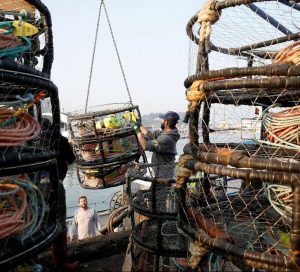
Crab fishermen and environmentalists square off over whale entanglements
The issue has pitted two local interest groups against each other: Those who depend on the $68 million California Dungeness crab fishery for their livelihood, and those who advocate shutting down areas to crabbing to protect humpback whales and other endangered species. Caught in between are everyday shoppers who love having Dungeness crab on their tables, but probably wouldn’t want marine mammals hurt in the process. “I’m frankly very scared of what the upcoming season could mean for whales,” said Kristen Monsell, senior attorney at the Center for Biological Diversity, an Oakland environmental group that sued the state over the issue last year. The case is due to go before a judge in February. >click to read<13:23

McGuire tackles crabbing, whale entanglement issues at committee hearing
“Domoic acid levels in the Pacific this year have been trending upwards, especially in Northern California,” McGuire said at the start of the hearing, held at Aquarium of the Bay in San Francisco. “Humboldt, Del Norte and southern Oregon have appeared as hot spots along the West Coast.” And while the 2015 crabbing season and spike in entanglements was one of the more talked-about issues during the hearing, McGuire added, “We do not expect another statewide closure like we saw in 2015.” This year alone, there have been 27 confirmed whale entanglements. That’s down from the 71 reported in 2016, but it is still more than double the state average.>click to read<10:31
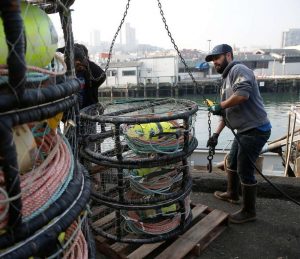
California seeks plan to protect whales and Dungeness crab fishery
Whales are a big deal, literally, as the most majestic, largest animals swimming off our shore. What the California Department of Fish and Wildlife has done in the past several years with our partners to prevent whale entanglements in fishing gear is a big deal, too.,, That is why our department is taking actions to protect the whales and our prized crab fishery. The department is working to create a conservation plan that will analyze the effects of crab fishing on whales, identify steps to minimize the risk of whale entanglements in the crab fishing gear, secure funding to implement the plan, and submit it to the federal government for needed approval. >click to read<12:14
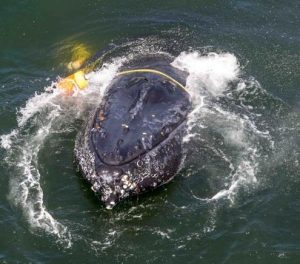
West Coast Whale entanglement data collected
Whale entanglements off the West Coast and potential solutions to the escalating problem are the focus of a new report including the presentations and observations of fishermen, biologists, and fisheries managers who gathered at an August workshop on the subject.,, The report provides the notes and presentations from the 31 California, Oregon, and Washington experts who attended. Participating were Dungeness crab fishermen; gear specialists; marine mammal biologists and disentanglement specialists; conservation groups; and federal, tribal, and state agency representatives.,, Participants also expressed interest in a gear innovation developed by fishermen in the lobster fishery on the East Coast. >click to read<08:33
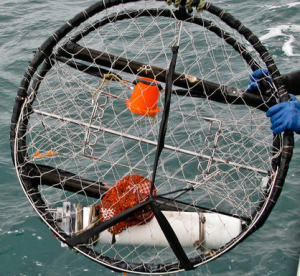
Study to help prevent whale entanglements off Oregon
COOS BAY, Ore. (AP) — Crab Commission is supporting a multi-year study to prevent whale entanglements off the Oregon Coast The Coos Bay World reports that the board of the industry-funded agency approved nearly $45,000 toward the three-year $300,000 project. The U.S. Coast Guard, Oregon Sea Grant, Oregon Department of Fish and Wildlife and Oregon State University Marine Mammal Institute plan to gather data on whale distributions and populations. .’>click to read<12:50
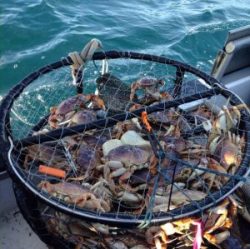
Coast Guard will help researchers track whales along the West Coast
The Oregon crab industry is putting up money to launch a new research study on where whales swim and feed along the Pacific Coast. The study stems from growing concern West Coast-wide about whales getting tangled in fishing gear. The Oregon Dungeness Crab Commission voted unanimously Tuesday to underwrite the first year of a three-year aerial survey of humpbacks, gray whales and blue whales off the coast. Oregon State University researcher Leigh Torres said the Marine Mammal Institute, which she leads, and the state Department of Fish and Wildlife hope to win a federal grant to cover years two and three. >click to read<22:57
California crabbers use GPS to find whale-killing gear
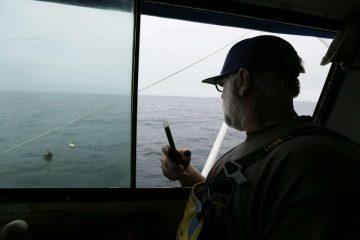 Fisherman Jake Bunch leans over the side of the fishing boat “Sadie K,” spears his catch, and reels it aboard: an abandoned crab pot, dangling one limp lasagna noodle of kelp and dozens of feet of rope, just the kind of fishing gear that has been snaring an increasing number of whales off U.S. coasts. This year, Bunch is one of small number of commercial fishermen out of Half Moon Bay, south of San Francisco, and five other ports up and down California who headed to sea again after the West Coast’s Dungeness crab season ended this summer. The California fishermen are part of a new effort using their cellphones’ GPS and new software pinpointing areas where lost or abandoned crabbing gear has been spotted. They retrieve the gear for a payment — at Half Moon Bay, it’s $65 per pot —before the fishing ropes can snag a whale. click here to read the story 20:44
Fisherman Jake Bunch leans over the side of the fishing boat “Sadie K,” spears his catch, and reels it aboard: an abandoned crab pot, dangling one limp lasagna noodle of kelp and dozens of feet of rope, just the kind of fishing gear that has been snaring an increasing number of whales off U.S. coasts. This year, Bunch is one of small number of commercial fishermen out of Half Moon Bay, south of San Francisco, and five other ports up and down California who headed to sea again after the West Coast’s Dungeness crab season ended this summer. The California fishermen are part of a new effort using their cellphones’ GPS and new software pinpointing areas where lost or abandoned crabbing gear has been spotted. They retrieve the gear for a payment — at Half Moon Bay, it’s $65 per pot —before the fishing ropes can snag a whale. click here to read the story 20:44
Oregon group tries to dodge California’s fate by addressing whale entanglement issues early
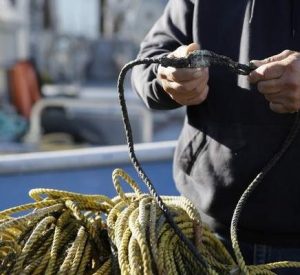 Oregon’s commercial fishing industry is trying to get ahead of a problem that could put California in the middle of a lawsuit and has the potential to drastically change Dungeness crab fisheries on the West Coast. Last year, 71 whales tangled with U.S. fishing gear off the coasts of California, Oregon and Washington state, as well as neighboring countries — the highest annual total for the West Coast since the National Oceanic and Atmospheric Administration began keeping such records in 1982. Sixty-six of these incidents happened in California, many of them involving endangered humpback whales tangled in commercial crab gear. At the end of June, the Center for Biological Diversity announced its intent to sue the California Department of Fish and Wildlife, which manages the fishery, for “causing the take of threatened and endangered whales and sea turtles.” click here to read the story 15:27
Oregon’s commercial fishing industry is trying to get ahead of a problem that could put California in the middle of a lawsuit and has the potential to drastically change Dungeness crab fisheries on the West Coast. Last year, 71 whales tangled with U.S. fishing gear off the coasts of California, Oregon and Washington state, as well as neighboring countries — the highest annual total for the West Coast since the National Oceanic and Atmospheric Administration began keeping such records in 1982. Sixty-six of these incidents happened in California, many of them involving endangered humpback whales tangled in commercial crab gear. At the end of June, the Center for Biological Diversity announced its intent to sue the California Department of Fish and Wildlife, which manages the fishery, for “causing the take of threatened and endangered whales and sea turtles.” click here to read the story 15:27






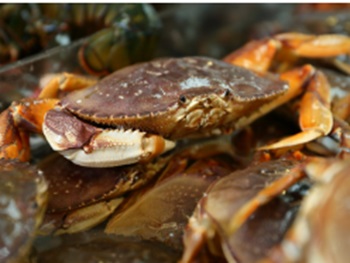
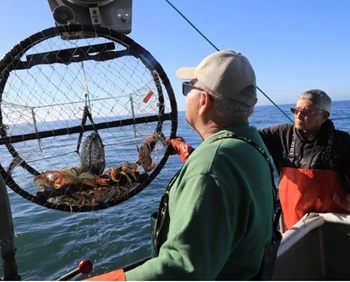






























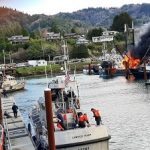
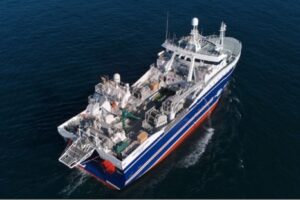
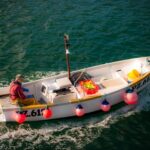
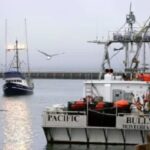
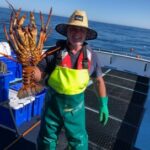
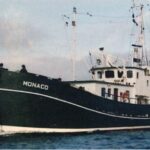
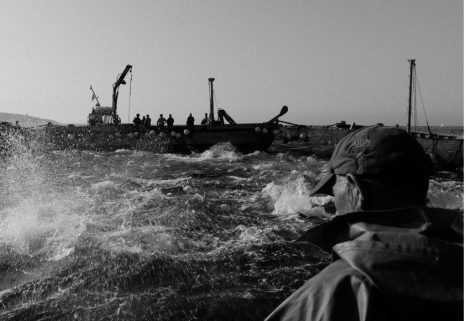
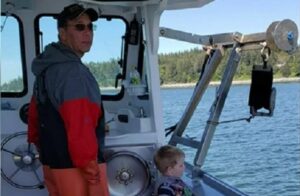
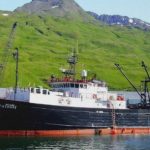
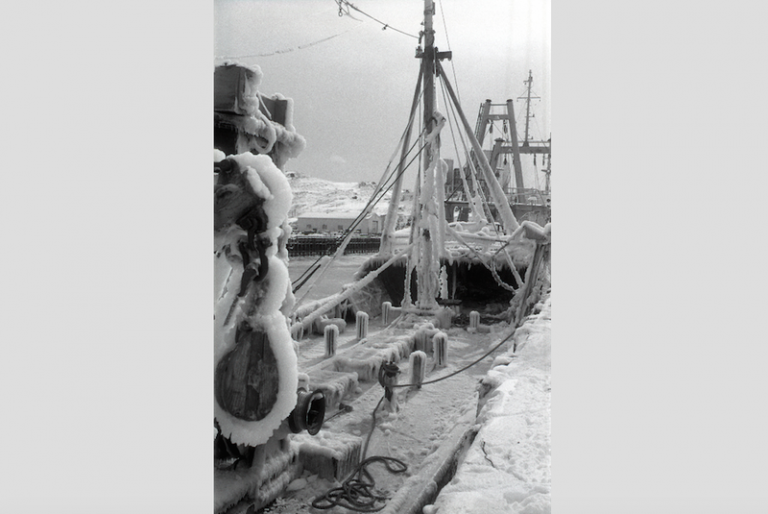

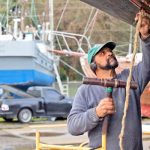



Maine delegation requests comment period extension for BiOp with profound impact on Maine lobstermen
The BiOp is an assessment of a federal agency’s impact on an endangered species. In this case, the Biological Opinion assesses the effectiveness of regulations that the National Oceanic and Atmospheric Administration has imposed on the Maine lobster fishery to protect the North Atlantic Right Whale. Maine lobstermen have already taken significant steps to protect the right whale, despite there being no direct evidence that a single right whale serious injury or mortality has been attributable to the Gulf of Maine or Georges Bank lobster fishery since 2004. >click to read< 09:29
Share this post